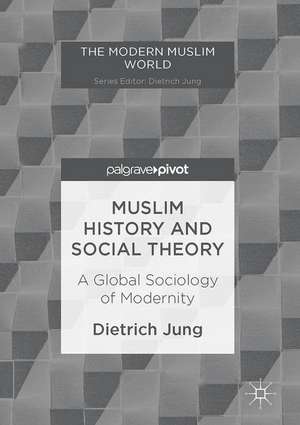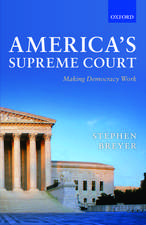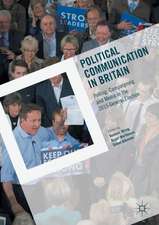Muslim History and Social Theory: A Global Sociology of Modernity: The Modern Muslim World
Autor Dietrich Jungen Limba Engleză Hardback – apr 2017
| Toate formatele și edițiile | Preț | Express |
|---|---|---|
| Paperback (1) | 411.32 lei 6-8 săpt. | |
| Springer International Publishing – 21 iul 2018 | 411.32 lei 6-8 săpt. | |
| Hardback (1) | 417.52 lei 6-8 săpt. | |
| Springer International Publishing – apr 2017 | 417.52 lei 6-8 săpt. |
Din seria The Modern Muslim World
-
 Preț: 386.81 lei
Preț: 386.81 lei -
 Preț: 383.93 lei
Preț: 383.93 lei -
 Preț: 388.13 lei
Preț: 388.13 lei -
 Preț: 386.39 lei
Preț: 386.39 lei -
 Preț: 386.99 lei
Preț: 386.99 lei -
 Preț: 386.81 lei
Preț: 386.81 lei -
 Preț: 388.90 lei
Preț: 388.90 lei - 15%
 Preț: 698.94 lei
Preț: 698.94 lei - 15%
 Preț: 584.26 lei
Preț: 584.26 lei - 15%
 Preț: 641.20 lei
Preț: 641.20 lei - 15%
 Preț: 699.77 lei
Preț: 699.77 lei -
 Preț: 385.08 lei
Preț: 385.08 lei - 14%
 Preț: 947.09 lei
Preț: 947.09 lei -
 Preț: 416.71 lei
Preț: 416.71 lei - 23%
 Preț: 671.23 lei
Preț: 671.23 lei -
 Preț: 446.08 lei
Preț: 446.08 lei - 14%
 Preț: 1198.04 lei
Preț: 1198.04 lei - 18%
 Preț: 778.76 lei
Preț: 778.76 lei - 23%
 Preț: 621.13 lei
Preț: 621.13 lei - 27%
 Preț: 703.23 lei
Preț: 703.23 lei - 14%
 Preț: 692.53 lei
Preț: 692.53 lei - 23%
 Preț: 671.75 lei
Preț: 671.75 lei - 23%
 Preț: 673.29 lei
Preț: 673.29 lei
Preț: 417.52 lei
Nou
Puncte Express: 626
Preț estimativ în valută:
79.90€ • 83.11$ • 65.96£
79.90€ • 83.11$ • 65.96£
Carte tipărită la comandă
Livrare economică 14-28 aprilie
Preluare comenzi: 021 569.72.76
Specificații
ISBN-13: 9783319526072
ISBN-10: 3319526073
Pagini: 119
Ilustrații: VIII, 133 p.
Dimensiuni: 148 x 210 x 17 mm
Greutate: 0.33 kg
Ediția:1st ed. 2017
Editura: Springer International Publishing
Colecția Palgrave Macmillan
Seria The Modern Muslim World
Locul publicării:Cham, Switzerland
ISBN-10: 3319526073
Pagini: 119
Ilustrații: VIII, 133 p.
Dimensiuni: 148 x 210 x 17 mm
Greutate: 0.33 kg
Ediția:1st ed. 2017
Editura: Springer International Publishing
Colecția Palgrave Macmillan
Seria The Modern Muslim World
Locul publicării:Cham, Switzerland
Cuprins
Chapter 1: Introduction: Searching for Similarities.- Chapter 2: Multiple, Entangled, and Successive Modernities: Putting Modernity in the Plural.- Chapter 3: Functional Differentiation, Theories of Emergence, and World Society: The Macro Level of Modernity.- Chapter 4: Contingency, Modern Subjectivity, and Cultural Types: The Micro Level of Modernity.- Chapter 5: Modernization, Organization, and Global Cultural Scripts: The Meso Level of Modernity.- Chapter 6: Conclusions: Emerging Global Modernity.
Notă biografică
Dietrich Jung is a Professor and Head of Department at the Center for Contemporary Middle East Studies, University of Southern Denmark. He holds a MA in Political Science and Islamic Studies, as well as a Ph.D. from the Faculty of Philosophy and Social Sciences, University of Hamburg, Germany, and has large field experience in the Muslim world. His most recent books are Orientalists, Islamists and the Global Public Sphere: A Genealogy of the Modern Essentialist Image of Islam (2011), and The Politics of Modern Muslim Subjectivities: Islam, Youth and Social Activism in the Middle East, together with Marie Juul Petersen and Sara Lei Sparre (New York: Palgrave, 2014).
Textul de pe ultima copertă
This book combines contemporary discussions on modernity with the history of the Muslim world. From a heuristic perspective, it is sketching out a framework for a global sociology of modernity. This framework attempts to accommodate a core assumption of classical modernization theory – the global nature of modernity – with the pluralistic perspective of the rise of a multiplicity of historically concrete forms of modernities. It tries to reconcile a universalistic concept of modernity with the fact of modernity’s multiple historical realizations. At the same time, this discussion of contemporary social theory puts forward a critique of the still so conveniently applied equation of modernization with Westernization. In empirical terms, the book substantiates this critique in drawing its exemplary illustrations from the historical experience of Muslim peoples. Bringing Muslim history and discussions in social theory together, this book represents a synthesis of research efforts in sociology and Islamic studies.
Caracteristici
Innovative sketch of social theory addressing fundamental questions of modernity Contributes to the ongoing debate about “multiple modernities” Valuable addition to contemporary discussions of Islam A quick read based on a wide array of theoretical and historical literature








